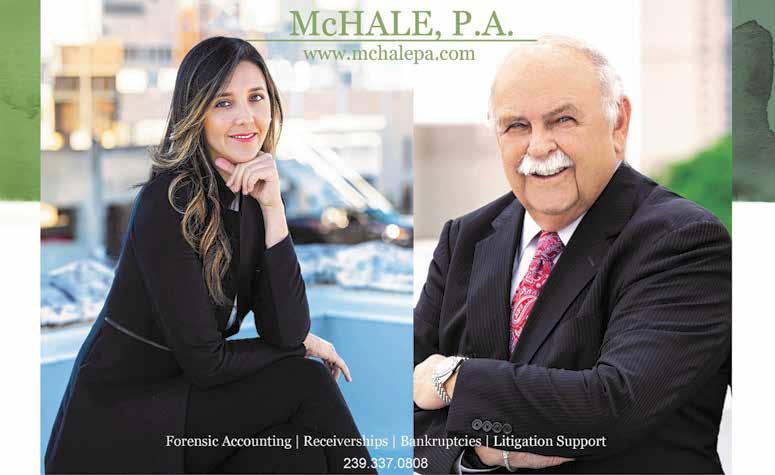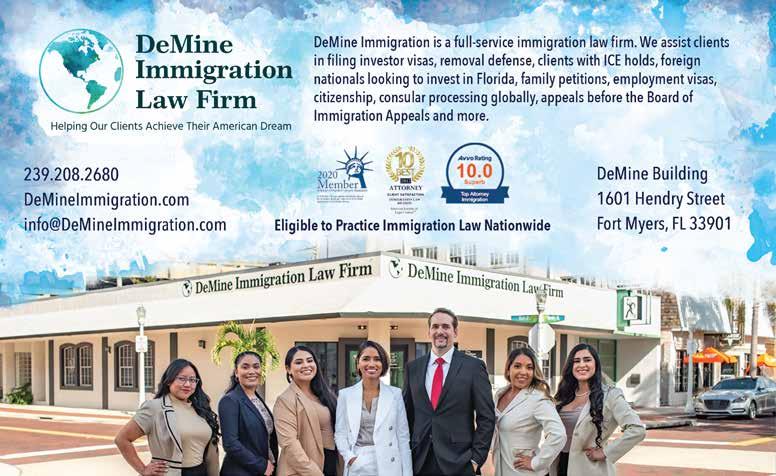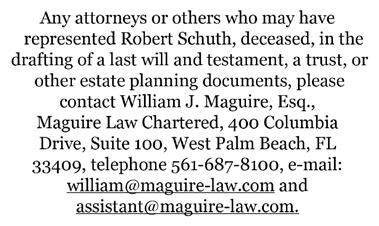
14 minute read
Guest Attorney
What is a Guardian Ad Litem?
A Summary of the role of a Guardian Ad Litem in Family Law Cases
by alexandra kleinfeldt, esq.
AGuardian Ad Litem (GAL) assumes an important role in family law cases involving minor children. A judge appoints a GAL to investigate issues relating to a particular family situation and to provide the court with information ensuring that the best interest of the minor children is protected. The GAL functions as the “eyes and ears” of the court.
Regrettably, minor children are often innocent victims in the middle of a war between their parents. A GAL can take on a significant role in family disputes over time-sharing, parental responsibility, or even relocation when assisting the court by providing insight into the unique family situation and dynamics. Often, parties and their attorneys do not understand the role of a GAL. They believe that a GAL acts like a parenting coordinator, facilitator, mediator, case manager, or the child’s “advocate.” The GAL often must correct this misconception. To shed light on the role of a GAL, we should look at Section 61.401 of the Florida Statutes, which governs the appointment of a GAL in family cases. This section clearly states that “the court may appoint a guardian ad litem to act as next friend of the child, investigator or evaluator, not as attorney or advocate.” The role of a GAL is clearly stated in the Florida Statutes and even explains what a GAL is not. The Third District Court pointed out that a GAL is “regarded as the agent of the court,” Franklin & Criscuolo/ Lienor v. Etter, 924 So.2d 947, 949 (Fla. 3d DCA 2006), emphasizing that a GAL is not an advocate.
Additionally, Section 61.401 offers the court the discretion to “appoint legal counsel for a child to act as an attorney or advocate” but prohibits the same person to accept both roles. Such information is critical for the attorneys to provide to the parties. Parties tend to call a GAL and inquire about the status of the case, complain about why time-sharing has not been changed yet, or request assistance in resolving issues. While cooperation by attorneys and parties is necessary for a GAL to conduct their investigation, a GAL cannot become involved in vindicating one party’s rights. However, attorneys and parties may reach out to the GAL and inquire about the GAL’s investigation on an issue to use this information in reaching a resolution. Parties tend to become frustrated or irritated because of the misguided conception of the role of a GAL that has been presented to them. Explaining the proper role of a GAL from the onset allows the parties to have realistic expectations and prevents these negative interactions between the GAL and the parties. Another important part of a GAL’s involvement in a case is their attendance at hearings, mediations, depositions, or other court proceedings. The GAL’s attendance assists the GAL in their investigation. Therefore, a GAL should also be included in the service of pleadings and documents to further their investigation. However, it is imperative to understand that a GAL should only be present at proceedings relating to matters involving the children. A GAL should not be involved in any discovery or financial dispute between the parents. The lines between acting as a GAL and being an advocate/attorney for the children can easily be blurred if the parties and attorneys involved in a case do not understand the proper role of a GAL. Strengthening the GAL’s effectiveness as a factfinder for the court can only be accomplished by understanding the precise nature of the GAL’s function. Everyone involved in the case must avoid undermining the GAL’s factfinding role by imposing or assigning new and additional tasks and obligations on the GAL.
Overall, for the GAL to be the effective factfinder and investigator for the court by keeping the best interest of the children in mind requires the understanding and cooperation of everyone involved in the case, most importantly from the attorneys and parents.
Alexandra Kleinfeldt, Esq. is the co-chair of the GAL Committee and the founder of Kleinfeldt Law Firm, PLLC where she practices in the area of Family Law, Guardianships, Estate Planning and Probates. She also serves the community as a Guardian Ad Litem, mediator, and arbitrator.



The Florida Voluntary Bar Leaders Conference is being held July 8-9 at the Vinoy Renaissance St. Petersburg Resort. The annual conference is designed as a place where local and specialty bar leaders gather to network, share the latest best practices and management techniques and discuss issues facing attorneys. The 2021 conference had representatives from approximately 45 organizations participate. Voluntary Bar Associations (VBAs) are comprised of statewide, regional and local organizations. These organizations are typically identified by geographic area (i.e. the Lee County Bar Association), by practice area or by affiliation with a particular group (such as the Miguel C. Fernandez Hispanic Bar Association). There are approximately 300 voluntary bar associations in Florida. LCBA Executive Director Lauren Baugh says, “Voluntary bars are a vital part of networking for any lawyer, paralegal or law student. Our VBAs in Florida provide opportunities that the Florida Bar is unable to provide.” Baugh continues, “VBAs get to create fun events for our members to attend while providing a social or educational environment for people who can both relate and understand what your general day-to-day is.” Besides meeting other lawyers, the networking opportunities also builds a community where lawyers, judges and other professionals who provide related services can get to know each other and work collectively. Interacting regularly with other professionals within the legal community usually leads to productive and professional work relationships. Furthermore, building these relationships creates social relationships as well as a referral network. Attorney Holly Cosby is finishing her term as President of the Calusa Inn of Court. The Calusa Inn of Court is a Lee County organization affiliated with The American Inns of Court. The mission is to advance the rule of law by achieving the highest level of professionalism through example, education and mentoring. Cosby explains the format of the Inn of Court is through pupilage groups. Small groups of attorneys and judges work together to analyze areas of law. They also present these topics to the whole membership, and these presentations typically offer CLEs that are harder to obtain. “It’s an opportunity to learn and share” in an informal setting, says Cosby. She also distinguishes the Inn of Court from other VBAs by saying, you are “steeping yourself in professionalism and civility”. The Inn of Court offers a community service component, as well. In the past, the members have assisted local food banks and Habitat for Humanity. Cosby says, “I raised a house with George Knott, his wife and Henry Paul. It was a lot of fun.” Because of COVID, it has been more difficult to participate in those types of activities.
Voluntary bars are a vital part of Instead, Cosby explains during networking for any lawyer, paralegal her presidential term, she has or law student. Our VBAs in Florida shared a focus on mental health provide opportunities that the Florida Bar is unable to provide. - Lauren Baugh at each meeting. Her goal is to provide support and ideas to improve mental health that will spread beyond the members in attendance. Cosby says being a member of the Inn of Court “is a deeper voluntary bar association experience”. The Inn of Court provides a more concentrated environment and more frequent access to other attorneys and judges. The opportunities to interact provided by VBAs not only foster relationships, they also build a lawyer’s reputation. Strong relationships, a solid reputation and a diverse referral network are not only valuable for the individual lawyer, they also benefit the lawyer’s firm. “The firms should always support their local bar associations, encouraging their attorneys to participate. Any local bar is a great referral source, a chance for your firm to get their name out there in the like-minded community to build and maintain professional relationships. Most voluntary bars also provide a source for attorneys to meet the judiciary and other dignitaries, which is always of benefit,” says Baugh. In addition to networking opportunities, VBAs serve as a place: • for lawyers to obtain continuing legal education; • for lawyers to participate in pro bono work; • to share developments in the law; • to report on legal trends; and • to educate the public about legal issues. Baugh says, “Most VBAs provide free or lower cost CLE opportunities, both electronically and in person to further the education of the membership. The goal of the LCBA is to aid our legal community with continued education
opportunities and legal networking that is both fun and provides a circle of referral sources for our members. The LCBA also provides an outlet to create a safe space to discuss the stresses of this career field and how to deal with them without burning out. We do all this through CLE, social events, health and wellness events and through our various Committees and Sections.”
“At the LCBA, we love working with other VBAs. That gives us a chance to learn about other’s events, CLEs and the like. Thus, we are learning how to improve and what we can offer and maybe not offer. We can make a better VBA experience for our members.” As the largest VBA in Lee County, the LCBA is also able to offer discounted rates to advertise in the organization’s legal publication (Res Gestae), as well as offer discounts on services relevant to the legal community. Available discounts include:
• CaseText Legal Research, • CopyLady, • Fort Myers YMCA, • Imagine Wellness Spa, • The Luminary, • Sidney & Berne Davis Art Center and • Waterman Broadcasting (NBC2 and ABC7). The other great thing about VBAs is you can join as many of these organizations as match your needs and interests. For example, the Miguel C. Fernandez Hispanic Bar Association was created in 2019 to promote and foster the advancement of the Hispanic legal profession as well as the larger Hispanic community. The Calusa Inn of Court was created in 1995. It caps its membership at 90, usually levels out at approximately 80 members. Cosby says attorneys should be involved in as many VBAs as possible “if you have the time” and are able to do so without jeopardizing your own health and wellness. Baugh says, “I would encourage anyone to join as many networks as possible. Each VBA gives a different take on a voluntary bar, and each one offers something different.”
Lauren Baugh Holly Cosby, Esq.

a mountain of debt

by keith grossman, esq.
Student debt is a serious consideration when deciding to attend law school. Although attorneys generally make a good income, a big portion of an attorney’s paycheck may be going toward covering the costs of their education, which can stretch to hundreds of thousands of dollars.
In an American Bar Association Young Lawyers Division survey, 90% of respondents had student loan debt. On average, respondents had $108,000 in J.D. loans and $130,000 in loans combined with undergraduate debt. Families are even questioning whether a traditional college education is worth the cost. In a recent poll by Gallup, 46% of parents said they would prefer their child pursue something other than a bachelor’s degree, and more than one-third cited finances as an obstacle.
The average cost of law school tuition varies based on the type of school you attend. Private or public. In-state or out-ofstate tuition. Location and school ranking also factor in. A law student needs to plan for three years of tuition, textbooks, room and board and other living costs. To manage these costs, some students continue to work full time while attending law school in the evening. Others plan out their financial path well before starting law school.
Iman Zekri, an attorney with Henderson Franklin, was able to obtain her undergraduate degree without accumulating any debt. She intended to go to a graduate school, and she had the benefit of watching her older siblings’ experiences and how they managed their finances.
Zekri attended Florida Gulf Coast University, which allowed her to live at home her first four years. While at FGCU, she completed her requisite service hours by interning at the Public Defender’s Office. She met an attorney there who had attended a private law school and was struggling to repay their student loan debt on the salary of a Public Defender. The attorney told Zekri, “If I can give you one piece of advice, it’s go to a public university.” Armed with that information, Zekri set her sights on the University of Florida law school. With her hard work, and a little bit of good fortune, Zekri was able to graduate law school at UF with no student loans. She accomplished this with a partial scholarship, savings she accumulated as an undergraduate and a small loan from her parents. University of Miami’s law school also offered Zekri a partial scholarship, but she decided it wasn’t the smart financial move. She says, “I would’ve been drowning in debt.” Zekri is aware of friends who are struggling with repaying their law school debt. In the ABA Young Lawyers Division survey, approximately 40% of law school borrowers said they were unable to reduce their debt balance since graduation; 27% of borrowers said their debt balances had actually grown since graduation. Casey Gartland, an attorney with The
Pendas Law Firm, is one of the many who have large student loan debt to manage. Gartland’s family was not able to assist him financially. He says, “I had to finance my entire student education.”
Gartland graduated from college in 2008. It was during a recession, and he was unable to find a job. He returned to school to obtain a master’s degree. After receiving his master’s, he worked a few years as a paralegal. He then went to law school. Although his three degrees are from public universities, he describes his situation as a “mountain of debt”.
According to Gartland, paying off student loan debt with the standard 10-year payment plan is cost prohibitive. He opted for an income-driven repayment plan. These plans base federal student loan borrowers’ payments on their earnings and family size. After 20 or 25 years of payments, the remaining balance is forgiven, but that amount is taxable. Most private lenders do not offer incomedriven repayment. Borrowers with private lenders could consider refinancing their student loans, which may allow them to Public interest lawyers may qualify for faster or tax-free forgiveness through other programs. Gartland says his student loan debt affects “just about every decision I’ve made”. These decisions have included what law offices he has worked in, what cities he would reside, how much rent he can afford, whether he can purchase a home, etc. “The debt is always on my mind.” When Gartland decided to attend law school, he participated in a pre-approval screening process and perceived it wasn’t going to be difficult to repay his student loans. He says, “It all made sense.” However, he says the advisors didn’t talk to him about “the factors and roadblocks that are a normal part of life”. His advice to future law students is “to save as much as you can and reduce the amount you have to borrow”. Due to the pandemic, people with federal student loans have been granted forbearance with no interest since March 2020, under the Coronavirus Aid, Relief and Economic Security Act. President Joe Biden has been considering whether to issue a student-loan forgiveness plan, and at the time of this article, it appears the White House is finalizing plans for student debt relief of $10,000 per borrower. This plan would be for Americans earning below a certain income level, probably below $125,000-150,000 for an individual.
A large percentage of existing student loan debt is debt that is specific to attending graduate school. It appears the loan forgiveness plan will be for both undergraduate and graduate school debt. It still must be determined if the president has the executive authority to forgive student loan debt or if the matter must go to Congress. Another consideration for any loan forgiveness plan is how to handle private lenders. The federal government can cancel debt it owns, but would the government have to pay private lenders?
THE EMOTIONAL IMPACT OF STUDENT DEBT*
The burden of student debt causes the majority of law graduates to feel negative emotions: 65.4% feel anxious or stressed 52.7% feel regretful or guilty 44.2% feel depressed or hopeless 41.8% feel inadequate 41.4% feel embarrassed or ashamed

*Source: 2021 ABA Young Lawyers Division Student Loan Survey Report
ADVERTISE HERE FOR MORE REFERRALS
Your fellow LCBA attorneys could be your #1 source. Contact Ryan Gonzalez advertising@conricpr.com 239.690.9840 Ext. 1013








